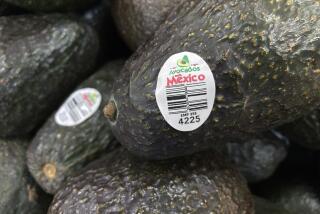Southeast Targeted for Exports : Mexico Adds 2 U.S. Trade Offices
- Share via
MIAMI — Under the gun to gear its economy to exports, Mexico is taking aim at flourishing markets in the Southeastern United States with two new trade offices in Atlanta and Miami.
“We want to increase foreign trade. That means exports and imports. We don’t have any numerical goals--the higher the better,” said Jorge Barreto, commissioner of the new Mexican Foreign Trade Institute in Miami.
While California and Texas, with large Mexican populations, are still Mexico’s biggest markets, the Southeast is practically virgin territory. Mexico hasn’t had a trade office in the Sun Belt since it pulled out of New Orleans in the 1970s, Barreto said.
Mexico has offices in Dallas, Los Angeles, New York, Washington and Chicago. It has 36 offices worldwide.
Florida, while it has many Latin American business connections, never had much business involvement with Mexico, according to Kenneth Lipner, an economist with Florida International University, because “we don’t have that many Mexicans living here.”
The new trade offices are part of Mexico’s efforts, demanded by creditors, to reduce its public spending and boost exports in an effort to pay off its $91.4-billion foreign debt, government officials said.
The Foreign Trade Institute offices were opened in Miami and Atlanta in May, the same month Mexico closed its tourist bureau in Miami as part of the government cost cutting. Mexico also opened business offices in May in Montreal and Puerto Rico.
The trade commissioner said Mexico wants to step up traditional exports such as Jalapena peppers, nachos and Tequila. But it also wants to increase exports of cement, marble, chemicals, bathroom fixtures and other finished goods, seafood and handicrafts.
“For a long time we have been selling what other countries wanted to buy from us. Now we are trying to sell what we want,” he said. “We know that we are a young country in foreign trade. We know that and we accept it, but we are on our way to getting better and better,” Barreto said.
A 15-year veteran of Mexico’s foreign trade promotion efforts, Barreto said in an interview that border-town souvenirs, paper toys and junk jewelry, have given Mexican goods an image problem, similar to the quality problem anything stamped “made in Japan” had 30 years ago. Mexico now sends about 150 tons of products per week, mostly seafood and canned goods, to Miami for distribution in the Southeast.
More to Read
Sign up for Essential California
The most important California stories and recommendations in your inbox every morning.
You may occasionally receive promotional content from the Los Angeles Times.










